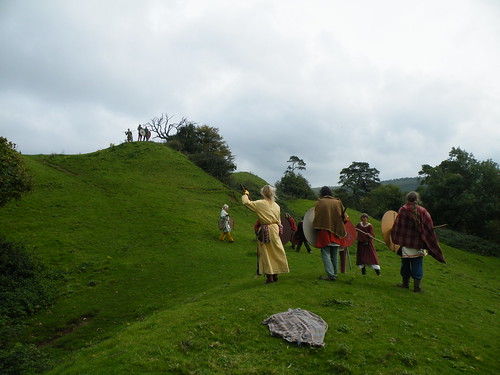This summer King Alfred went out to sea with an armed fleet, and fought with seven ship-rovers, one of whom he took, and dispersed the others.
With the Vikings leaderless and facing rebellions in their holdings in Northumbria and East Anglia, King Alfred of Wessex spent 875 building up his forces. This included developing a navy, creating a force that could protect Wessex’s long sea-coast. They zealously patrolled the English Channel, and soon found success, managing to defeat a Viking fleet of seven longships.
With the Viking fleet dispersed and part-destroyed, a small group of Viking raiders found themselves washed up on the coast of Dorset. They struck north, trying to get to Viking-controlled Mercia. However, Anir Thane of the Sumersaete heard rumours of these armed troops crossing Wessex and decided to hunt them down, with aid from the visiting Cilternsaete. Pushing north from Sherborne, they saw smoke rising from raided farmsteads. Knowing that the Vikings would be looking for a defensive position to break their journey in, they advanced rapidly to occupy the great hillfort of Cadbury, said to have once been the seat of King Arthur.
The Viking forces were bitterly arguing among themselves, clashing over which direction they should be heading and whose fault it was that their ship was ruined. The Holmbyggjar had raided a church, and fetched a precious relic: the shoulder blade of a holy sheep, once owned by a local saint. They planned to use it to buy safe passage, if cornered by the Englisc.

The
Oestvikingae had got their own plan for buying their way to freedom: taking a prominent local hostage. They were chasing one suitable person, a rich but unarmed man named Ælf, who headed into the hillfort of Cadbury. The Vikings followed, little realising that Anir Thane’s forces were waiting there for them… But Ælf was too fast, and the Oestvikingae were slowed by injuries from their recent fights. They chased him over the top of the hillfort, only to find that he had vanished, to be replaced by the Englisc forces. The Oestvikingae tried to negotiate, promising to flee straight out of Wessex, but the Englisc had come to fight not talk, and charged down the slope. Thorhelm and Visna fell wounded, and Hauk fled. He managed to meet up with the
Westmen, but the Englisc fell on them again, and defeated them again.

The victorious Englisc pushed on, seeking more Vikings to kill. They came across the
Holmbyggjar, who attempted to use cunning to escape with their lives: “We’re not Vikings! We’re members of Alfred’s navy, chasing those naughty Vikings.” “What’s your favourite cheese?” “Jarlsburg – no, I mean Cheddar!” With their disguise penetrated, the Englisc attacked the Holmbyggjar, overcoming them and rescuing the holy sheep’s shoulder blade. The Englisc then continued to patrol the area, driving off or destroying all the Vikings they could find.

Meanwhile the
Westmen regrouped, and “helped save Ælf from falling off the ramparts”. With the hostage secured, they moved to escape the hillfort… Only to be set upon first by the Holmbyggjar (who they defeated) and then by the Englisc (who defeated them, before crushing the Oestvikingae as well as they tried to slip past).

Later, the Englisc met with the remaining defeated Vikings seeking to negotiate their passage. The Holmbyggjar provided a magnificent feast, booze flowed freely, and every unit providing entertainment: poems, songs, and tales of past glories. The Englisc were triumphant but also magnanimous: boasting of their successes to make it clear that any Vikings who stood against them or raided the area would face destruction, but granting the Vikings their lives, and passage out of Wessex.
Herewulf’s Boast
The wise man boasts of what he has done, not what he dreams of doing. What did we three do?
We were three. We met a group of warriors. They were three, we slew them. They were the Oestvikingae.
We were three. We met a group of warriors. They were three, we slew them. They were the Westmen.
We were three. We met a group of warriors. They were three, we slew them. They were the Holmbyggjar.
At the end of the days fight, we three held both the relic and the hostage.
The Vikings vowed to leave directly, to head East or North, to deal with the uprisings in East Anglia and Northumbria and the encroaching fleet of King Harald Fair-Hair. However the next morning, as the Englisc awoke, shook off their hangovers, and saw that the Vikings had decamped, they realised that their sacred relic, the shoulder blade of the holy sheep which belonged to a saint, was missing…



